
Read our 2023 annual report

Knowledge Hub
How are the world’s poorest countries faring in the battle against COVID-19?
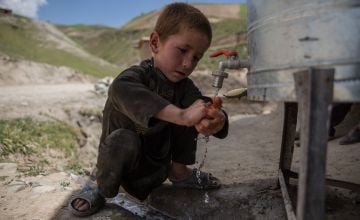
As life returns slowly to normal in many high income countries, COVID-19 is reaching its deadliest peak in some of the world’s poorest places.
As of July 27 2021, there have been 194.1 million confirmed COVID-19 cases and 4.1 million deaths worldwide.
Some nations with the resources to roll out a comprehensive COVID-19 vaccination programme, along with effective public health and education strategies, are seeing slower transmission as well as fewer deaths and serious complications from the virus.
In many of the 23 countries where Concern works, however, dealing with a pandemic of this scale is fraught with challenges.
Here we examine how COVID-19 is impacting the lives of people living in extreme poverty around the world.
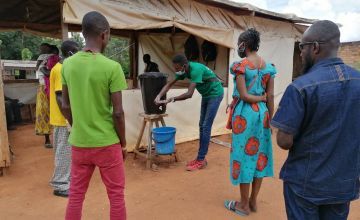
Africa
July saw the number of deaths from COVID-19 rise by 43% in just one week across the continent, according to the World Health Organisation (WHO) Africa.
The organisation confirmed that the proportion of deaths among confirmed cases currently stands at 2.6%, compared with the global average of 2.2%.The number of cases across the continent has reached almost 6.5 million with public fatigue, socialising, ineffective use of public health and social measures all said to be potential contributors to the rise.
The highly transmissible Delta variant first detected in India late last year is also a big driver of the surge in new infections, with its presence confirmed in at least 21 African countries so far.
There is concern that new variants can't easily be tracked because the testing required to identify them isn't widely available.
Slow vaccine rollout
The continent also falls behind with vaccination, accounting for just under 1.5% of all the vaccines administered globally so far.
Earlier this month, The WHO approved Monoclonal antibody therapies for treatment of COVID-19 patients.
However, the high cost of around US$2,000 per patient will prevent many African people from accessing the therapies, according to Dr Matshidiso Moeti, WHO’s Regional Director for Africa.
"We are advocating for generics to be produced rapidly to make these products more affordable," she said.
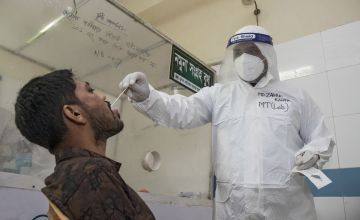
Middle East and Asia
According to Reuters, there have been more than 60.7 million reported infections and 874,000 reported deaths caused by COVID-19 in Asia and the Middle East so far.
The region accounts for around 39 out of every 100 infections last reported around the world as an estimated million new infections are confirmed every five days.
The WHO last week warned that the COVID-19 pandemic is reaching a ‘critical’ point in the Middle East.
There were fears of a potentially ‘catastrophic’ upsurge in cases during the Eid al-Adha feast in July as people attended religious and social gatherings.
Access issues
Hampered by limited access to testing and vaccines, Afghanistan is one country that has been battling to control a rapid surge in COVID-19 in recent weeks.
The nation’s vaccine programme was dealt a serious blow last month when the WHO told health officials that three million doses expected to arrive by April will not be delivered until August, according to Al Jazeera.
Meanwhile just 500,000 tests have been delivered to a population of about 40 million since the pandemic started, the Ministry of Public Health has stated.
The United Nations (UN) says that 42% of those being tested are positive for the virus.
However, the lack of a national death register combined with low testing rates means, "confirmed cases of and deaths from COVID-19 are likely to be underreported overall in Afghanistan", they added.
In Bangladesh, COVID-19 infections reached a peak on July 15 while July 19 saw 231 deaths, the country's highest daily number to date. There are currently 11,828 new infections being reported on average each day, according to MSN Asia.
Reliefweb reports that just 6.7% of the population has been fully vaccinated with around 11.3 million doses administrated to date.
Haiti
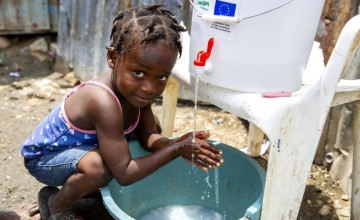
With a total of 19,563 cases and 510 deaths as of July 20, Haiti has one of the lowest COVID-19 death rates in the world.
However, inconsistencies in post mortem testing means these figures may not accurately reflect the reality.
Dr. Wislet André, a specialist in internal medicine at the General Hospital in Port-au-Prince explained that some hospitals don’t test those who die.
He told the New Humanitarian that PCR tests can only be processed by two laboratories in the country, leading to delays of three to four days in accessing results.
Dr André said: “If someone dies and you didn’t have time to do the test beforehand, it is difficult to count them accurately.”
Until recently, Haiti was one of just five countries that had not rolled out a COVID-19 vaccine programme.
There were concerns that the country could be hit with a surge when it experienced a recent spike in cases.
However, Haiti last week received its first batch of 500,000 doses, which were donated by the U.S. and delivered through the WHO’s COVAX initiative for the equitable distribution of COVID-19 vaccines.
How Concern is responding
The COVID-19 pandemic has presented an unprecedented challenge for the countries where we work.
This was the first time in our 52-year history where a crisis affected all of our programme countries and our head offices. Our organisational commitment to stay and deliver held strong, enabling us to deliver on three core priorities: ensuring the health and safety of our almost 4,000 staff; scaling up COVID-19 awareness and prevention across the communities with whom we work; and adapting our ongoing programmes enabling them to keep operating to the fullest extent possible.
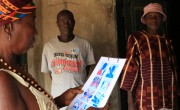
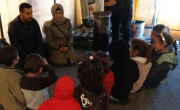
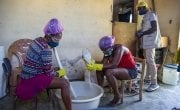
Throughout this crisis, our organisation has striven to raise awareness of the tools needed to fight infection spread and support the hardest hit communities
Africa
- We trained staff in 75 health centres in COVID-19 infection control and response in Central African Republic (CAR).
- We supplied 55, 366 people with soap and hand sanitisers in Somalia
- We installed handwashing points at 50 locations, including transport areas, petrol stations and markets in Sierra Leone
Middle East and Asia
- In Syria, we distributed 20,000 food baskets and hygiene kits to vulnerable people
- In Iraq, we distributed detergent, hand soap, and hygiene products to 84,500 people
- In Bangladesh, we reached 802,246 with COVID-19 awareness messaging
Haiti
- We reached over 265,000 people with our COVID-19 response, which included raising awareness, setting up handwashing stations and distributing WASH kits
- We arranged cash transfers for 4,000 vulnerable households
- We delivered soap-making workshops in communities across Port-au-Prince, empowering people with a means to hand-wash effectively to protect themselves from COVID-19, as well as providing a new source of income for people whose livelihoods had been disrupted.
Connect with our community
Join the conversation by following us on Instagram as well as our other social media channels.




